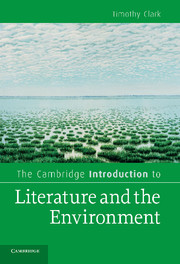Book contents
- Frontmatter
- Contents
- List of illustrations
- Preface
- Acknowledgements
- Introduction
- Romantic and anti-romantic
- The boundaries of the political
- Chapter 7 Thinking like a mountain?
- Chapter 8 Environmental justice and the move ‘beyond nature writing’
- Chapter 9 Two readings
- Chapter 10 Liberalism and green moralism
- Chapter 11 Ecofeminism
- Chapter 12 ‘Post-colonial’ ecojustice
- Chapter 13 Questions of scale
- Science and the struggle for intellectual authority
- The animal mirror
- Notes
- Further reading
- Index
- Cambridge Introductions to …
Chapter 11 - Ecofeminism
Published online by Cambridge University Press: 05 June 2012
- Frontmatter
- Contents
- List of illustrations
- Preface
- Acknowledgements
- Introduction
- Romantic and anti-romantic
- The boundaries of the political
- Chapter 7 Thinking like a mountain?
- Chapter 8 Environmental justice and the move ‘beyond nature writing’
- Chapter 9 Two readings
- Chapter 10 Liberalism and green moralism
- Chapter 11 Ecofeminism
- Chapter 12 ‘Post-colonial’ ecojustice
- Chapter 13 Questions of scale
- Science and the struggle for intellectual authority
- The animal mirror
- Notes
- Further reading
- Index
- Cambridge Introductions to …
Summary
The term ecofeminism has been widely used since the late 1980s to name a growing political, cultural and intellectual movement, both activist and academic. Ynestra King has named it ‘the third wave of the women's movement’. Its defining claim is that the destruction of the environment and the historical oppression of women are deeply linked.
Ecofeminist thinkers come to environmental issues expert in controversies about distinctions between sex (‘natural’) and gender (‘cultural’), questions of whether the category ‘woman’ or ‘women’ has any clear natural referent or is not, in fact, an unstable product of social conditions. This helps render ecofeminism perhaps the most sophisticated and intellectually developed branch of environmental criticism. It is especially sensitive to the environmental implications of differing conceptions of human personhood. Nevertheless, as Glynis Carr writes, ‘While ecofeminist philosophy and politics are relatively well developed, ecofeminist literary theory and criticism are not’, a discrepancy that arguably applies to ecocriticism generally.
The following statement by Donna Haraway would now command almost universal consent among ecofeminists and the majority of ecocritics:
certain dualisms have been persistent in Western traditions; they have all been systemic to the logics and practices of domination of women, people of color, nature, workers, animals – in short, domination of all constituted as others, whose task is to mirror the self. Chief among these troubling dualisms are self/other, mind/body, culture/nature, male/female, civilized/primitive, reality/appearance, whole/part, agent/resource, maker/made, active/passive, right/wrong, truth/illusion, total/partial, God/man.
- Type
- Chapter
- Information
- The Cambridge Introduction to Literature and the Environment , pp. 111 - 119Publisher: Cambridge University PressPrint publication year: 2011

